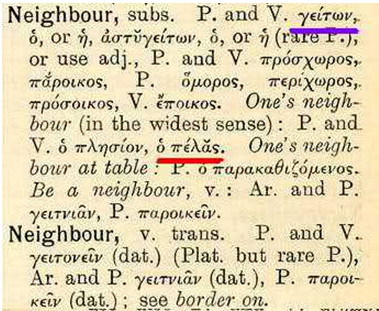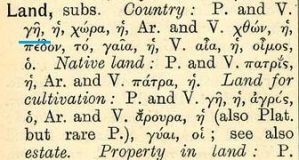THE PELASGIANS… OUR NEIGHBORS
January 21, 2009 2 Comments
Many people have tried to explain the meaning of the word Pelasgoi or Pelasgian. We already know the inhabitants of Pelasgia ( Argos capital) were called Danaioi(Argives) were named after their king Danaus.
In the historical sources, the Danuna are known by many different names such as Denyen, Danunites, Danaoi, Danaus, Danaids, Dene, Danai, Danaian.
These were the same people who attacked Troy and wrongly considered by the historiography as Hellenes(Greeks).
Danaus, or Danaos ( Δαναός), was a mythological character, twin brother of Aegyptus and son of Achiroe and Belus, a mythical king of Egypt. The myth of Danaus is a foundation legend of Argos, one of the foremost Mycenaean cities of the Peloponnesus. In Homer’s Iliad, “Danaans” (”tribe of Danaus”) and “Argives” commonly designate the “””””Greek””””” forces opposed to the Trojans.
Evidently Argeoi, Pelasgjoi, Danaidai, Mykenaoi, Argives, Pelasgos, Pelasgjikos, Pelasgjia, Argolis are interchangeable for each other. They represent the same people and land, the Pelasgians of Peloponnesus originally from Egypt.
They inhabited a vast territory, mainly Peloponnesus and Epirus. That was the situation before the arriving of the real “Greeks” the Hellenes (Dorians). It’s logical that these Hellenes were just next to the Pelasgians (Danaoi, Argives, and Achaeans) before, and then subdued them. In other words they were neighbors to each other.
Being so, it’s normal that they could have been called our neighbor, by the Hellenes.
Let’s take a look at the word neighbor:

It’s evident that pelas means neighbor, and
gjë or gja means land.
Thus PELASGIA literally means the land adjacent ours, or the neighbor land.
So Pelasgians are the neighbor of the Hellenes (Dorians or Heraclites, an Illyric nation)
Like we can see pelas is not the first correspondent word for the neighbor. The exact correspondent word is GEITON which is pronounced gjiton.
This pronunciation is totally the same with the Albanian word:
|
English (3 entries.) |
Shqip (3 hyrje.) |
|
neighbour, neighbor |
gjiton / gjitone |
|
neighbour, neighbor |
fqinj / fqinje |
|
neighbour, neighbor |
komshi / komshie (shumës komshinj) |
The natural question would be: “Is the above word a loan from Greek”?
No. The Albanian word gjiton derives from the adverb ngjitur (in the Gheg dialect ngjit which means near, close by, adjacent to and/or from the adjective e ngjitur which is the same thing.
|
English (18 entries.) |
Shqip (18 hyrje.) |
|
adjacent |
i/e ngjitur, afër |
The very source of this word is the Albanian verb ngjis:
|
Attach, close up, bring close to, bring near |
ngjis (kr. thj., pj. ngjita, ngjitur) |
Do we have the correspondent word in ancient “Greek”. Yes we do
The word εγγύς is pronounced engjis.
Its obvious that the source of the word is the Albanian verb e ngjis which forms the place adverb ngjitur or ngjit(in gheg) or ngjitun(in gheg).
|
English (3 entries.) |
Shqip (3 hyrje.) |
|
near (adverb) |
Pranë, ngjitur |
|
near (adverb) |
Afër, ngjitur |
|
next, next to |
ngjitur, ngjitur me |
What is a neighbor?
Neighbor:
n.
1. One who lives near or next to another.
2. A person, place, or thing adjacent to or located near another.
v.tr.
To lie close to or border directly on.
v.intr.
To live or be situated close by.
adj.
Situated or living near another
The Ancient Greek language is always seen as a separate branch of IE languages.
That is not true. The truth is as the following:
- The Ancient Greek is not the language of the Hellenes
- The Ancient Greek is the language of the Pelasgians.
- The Ancient Greek is the language of the Pelasgian group of Egypt.
- Hellenes have spoken originally an Illyrian dialect.
- Ancient Greek (Pelasgian language) and Illyrian language have the same source (probably the later could be the source of the former).
- Most of the Hellenes lost their original language.
- The language of the literature(Attic, Ionic) is a conventional one its not the spoken language.
- Unlike most of the beliefs that language of the Hellenes evolved in the today Modern Hellenic, I strongly believe that the later one is artificial bastard imitation and morphologically unable to explain the former.
- Graicoi is not the same with Hellenes, Aristotle is definitely wrong.
- Graicoi are a mix Semitic-Thracian tribe while Hellenes an Arian migration.
- Hellenes represent the vanguard of the south Illyrian tribes returning back in the Peloponnesus which was their land before the invasion of the Egyptian Pelasgians.




Can I ask from where you have this informations ? because is totally wrong!
The Ancient Greek language is always seen as a separate branch of IE languages.
That is not true. The truth is as the following:
The Ancient Greek is not the language of the Hellenes
The Ancient Greek is the language of the Pelasgians.
The Ancient Greek is the language of the Pelasgian group of Egypt.
Hellenes have spoken originally an Illyrian dialect.
Ancient Greek (Pelasgian language) and Illyrian language have the same source (probably the later could be the source of the former).
Most of the Hellenes lost their original language.
The language of the literature(Attic, Ionic) is a conventional one its not the spoken language.
Unlike most of the beliefs that language of the Hellenes evolved in the today Modern Hellenic, I strongly believe that the later one is artificial bastard imitation and morphologically unable to explain the former.
Graicoi is not the same with Hellenes, Aristotle is definitely wrong.
Graicoi are a mix Semitic-Thracian tribe while Hellenes an Arian migration.
Hellenes represent the vanguard of the south Illyrian tribes returning back in the Peloponnesus which was their land before the invasion of the Egyptian Pelasgians.
You should give your view about this information supplied with valid arguments, like I did on the above article.